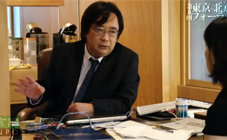The Tokyo-Beijing Forum, a private-sector workshop between Japan and China, has contributed to building mutual trust between leading figures in the two countries in its eight years of dialogue, according to Genron NPO Representative Yasushi Kudo.

When the workshop was launched in 2004, Japan-China relations had become very difficult, as instanced by China's angry reaction to then Japanese Prime Minister Junichiro Koizumi's visit to the war-related Yasukuni Shrine in Tokyo and tension over a territorial issue involving a group of isles effectively controlled by Japan in the East China Sea. Government-to-government consultations had almost come to a standstill.
"In these circumstances, we (Genron NPO members) wondered what private-sector people or citizens could do to improve relations between Japan and China, and decided that a channel of dialogue should be established between the two countries," Kudo recalled.
At the first meeting of the workshop, Chinese participants only repeated China's fundamental position when the two sides discussed problems of mutual concern, and as a result, there was no dialogue in the true sense of the term. But moves have emerged in the eight years since then toward discussing ways to resolve pending problems between the two countries, Kudo said.
Interviewed after the end of the eighth meeting of the forum in Tokyo from July 1 to 2, Kudo said that he felt the strength of serious dialogue at the latest session. Because there can be no such dialogue unless participants respect each other, trustful relations had been established between many opinion leaders who took part in the meeting from the two countries, he said.
About 40 Chinese dignitaries, including a Cabinet minister, came to Japan to participate in the latest meeting.
Top leaders in the Chinese media and business communities also attended the meeting. Since Japan-China relations are not very favorable, leading figures' visits to Japan are almost nonexistent, but many Chinese took part in the meeting because the workshop has been held every year, according to Kudo.
At the just ended meeting, there was no discussion that focused only on playing up confrontation and criticizing the other side, he said. In a subgroup discussion about media-related problems, Kudo noted an opinion poll that shows 84 percent of Japanese have an unfavorable view of China, an indication that the Japanese are rather irritated by pending problems between the two countries, including the territorial issue involving the Senkaku Islands, called the Diaoyu Islands by China.
A survey on the Chinese side shows that some Chinese believe the soured relations between Japan and China may be due to anti-Japanese remarks in Chinese school textbooks or excessively nationalistic feelings in China.
Not a few Chinese participants were seen expressing critical views toward their behavior.
Problems in the diplomatic and political fields cannot be entirely left to government officials or diplomats, Kudo said.
If Japan's political situation was not in such a mess or if Japan was able to speak for itself in the diplomatic field, proper discussions could be held with the countries concerned, but Japan is not in a position where this can be done, he said.
Should the government perform its functions properly, intergovernmental talks may come to a halt, only when bilateral relations worsen.Media organizations may criticize each other's side, only helping to worsen the feelings against each other, while the business community may remain silent in order not to lose business opportunities. In that event, who can improve the situation? he asked.
Individuals then will have to play roles that are different from those of the government and various organizations, Kudo said.
Some people may have a sense of incongruity about dialogue between Japanese citizens and China, but private-sector dialogue cannot be realized without individuals, he said.
Individuals and citizens should be aware that they are also "parties directly involved" in problems facing Japan, Kudo said.
Especially because Japan is located next to China, which is becoming powerful, "the situation is so dangerous that it cannot be left to someone else," he said.
The Chinese have come to realize the importance of the annual workshop.
Zhao Qizheng, chairman of the Committee for Foreign Affairs of the National Committee of the People's Political Consultative Conference, welcomed the dialogue as "public diplomacy," according to Kudo.
The Tokyo-Beijing Forum is actually a private channel, but it provides an opportunity for discussion for politicians, government officials and journalists. So far, the Chinese had only knowledge about governmental consultations and private-sector interchanges, but public diplomacy has emerged as a new concept for them.
"This tells us how the times are changing and we should be aware that we are parties directly involved," Kudo said.